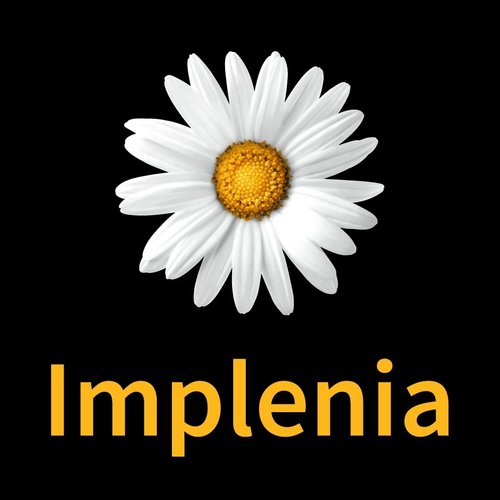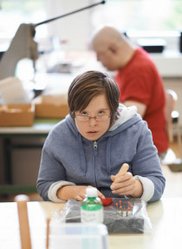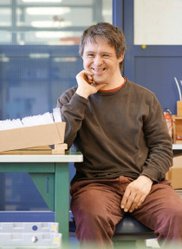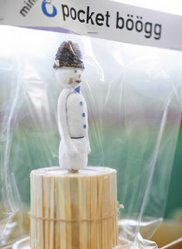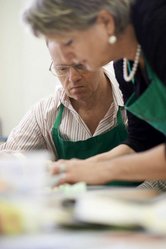“Everyone should have this experience at least once”
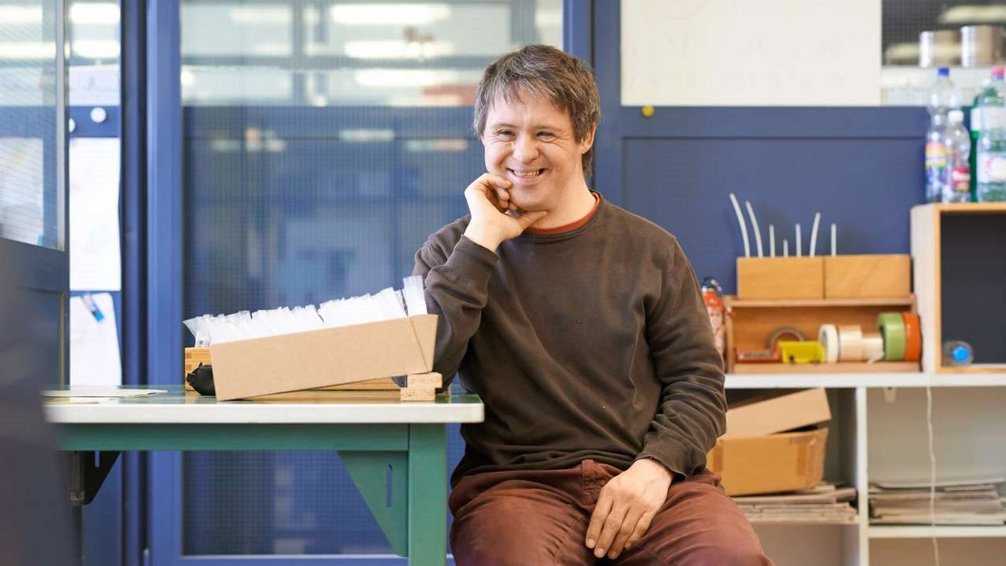
This is the moment everyone realises what it’s all about, and understands how very different working here is from their work at Implenia. This is the moment during the tour when Marc Herpers, head of the day-care facility, goes up to a workbench holding a handsaw, picks up a piece of wood the size of a domino and says, “This is the product of a day’s work by one of our clients. He’s been working on it all day and has really enjoyed it.” For people from the construction industry who handle tonnes of building materials every hour, this little piece of wood is a powerful symbol of the world they have entered today. It suddenly makes them very aware that things are different here.
“What we are doing here is an experiment,” Cornelia Widmer, Implenia Event Organiser, had said as the visitors were welcomed just a few minutes before. Eight people from different parts of Implenia are taking part in this experiment – the company’s first work assignment for its employees at an institution for disabled people. Instead of driving to their normal place of work, they have come this morning to this brick-built commercial building in Zurich Altstetten where the RgZ Foundation occupies two floors of workshops and recreation rooms. The work assignment is a pilot project that forms part of Implenia’s social sponsorship programme (see short interview).
On the tour, the Implenia employees learn about the place they’ll be working in for the next few hours. Some of them will help in the day centre, and others in the production unit. “Our clients are already looking forward to the support,” says Herpers, adding that they had asked that everyone use the familiar “du” form of address. “Its standard practice here and makes it easier to get to know each other”.
After the tour, the Implenia employees divide themselves up into different groups. The walls of the day centre are full of pictures, photographs and creations made of different materials. Construction carpenter Moritz Vollenweider sits at a large table in Creative Workshop 2 and listens to Thomas explain how to make a felt ball. He then has a go and soon realises that big powerful hands like his actually make it quite hard to create a round ball. But Thomas is patient, giving tips until his pupil is doing it right and the ball slowly takes shape. Here, and in the other day centre rooms, the mood is very relaxed and the Implenia people soon get talking with the clients. Many of the regulars are happy to explain what they are doing and show their handiwork.
After a break, Edwin Hensch who has stepped in to manage Creative Workshop 2, calls the clients together for a meeting. Everyone talks about what they did the previous weekend – like going on trips with parents and friends. Some are very articulate, some monosyllabic, and some express themselves in noises that are hard for newcomers to understand. In these cases Edwin Hensch is on hand to translate. This is not a special programme laid on by RgZ for Implenia. The Implenia employees are simply taking part in the disabled people’s everyday lives. Moritz is the last to speak, and he tells the group about the pleasant weekend he spent with colleagues.
Two floors up in the production unit, there is a slightly different atmosphere. The walls are bare and the employees work at long tables, concentrating hard as they prepare a mailing for dispatch. The documents are being carefully folded and stacked. There’s not much talking. “It’s a bit stressful at the moment,” explains Vincenzo de Feo, Head of Production. They have to get 13,000 personalised mail shots ready in just two days, so a couple of additional pairs of hands from Implenia are most welcome. Florian Mattenberger and Stephan Suter, who usually work on conversion projects in and around Buchs, have sat themselves down on a bench and started stuffing envelopes. “Having to cope with pressure is the reality these days in the workshops,” says de Feo. RgZ has to raise 40 percent of its operating costs from its own efforts on the market, so meeting deadlines and maintaining quality are as important here as on a construction site. At the end of the day, the employees are naturally proud if they have fulfilled an order on time. They want to be challenged and they are paid for their work – between 300 and 1000 francs per month depending on how efficiently they work.
Another hundred envelopes and it’s time to join everyone for lunch. The morning has flown by. Over a plate of spaghetti, co-organiser Cornelia Widmer explains that she deliberately didn’t brief the Implenia participants much in advance and more or less threw them in at the deep end. “We wanted to see how they got on and whether the idea would work at all.” One person who has no doubts is Maurizio Giovanelli, Head of Modernisation in the Central Region. He returns from his creative workshop with huge enthusiasm: “That was fantastic. All our people should do this at least once!” The other employees at the table back him up. They also agree that a whole day would be better than half so they could get to know the people who work here better. These are not just empty words: as soon as the official part of the visit is over shortly after lunch, the Implenia employees head not for the exit but back to their group to do a little more work. By the time the day comes to an end, Moritz Vollenweider has finished his second felt ball.
WIDE VARIETY OF PRODUCTS
The Rauti workshop in Zurich Altstetten provides a total of 90 jobs. The paid work involves packaging and dispatch tasks, assembly of parts and machine processing of components. The workshop also makes a wide range of its own creative products, including highly imaginative greetings cards. The handy-sized “Taschenböög” is one of the big sellers. It’s like the “Böög” effigy burnt at one of Zurich’s traditional festivals, but this one can be immolated at home! Great fun for people who want to spice up their garden party.
RGZ FOUNDATION
The Foundation has been giving disabled people accommodation and work for thirty years. Thanks to new therapies and encouragement, people with disabilities have better opportunities than previously to make the lives they want. Jobs at the RgZ workshops and care homes give people with disabilities a chance to do meaningful work. Contrasting activities, such as swimming, calisthenics and educational courses ensure that the days at work don’t become too monotonous.
